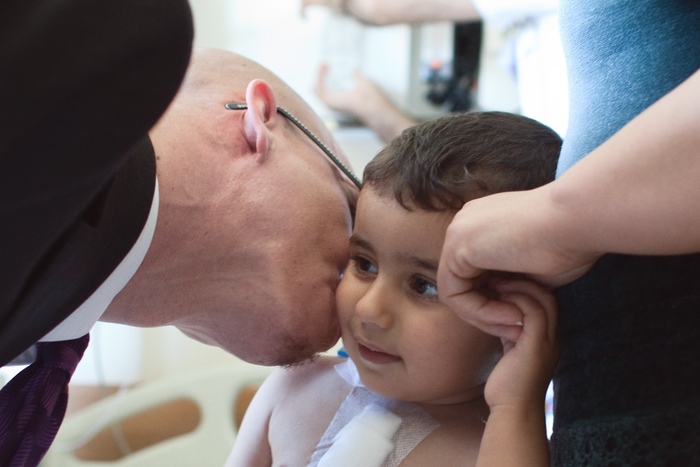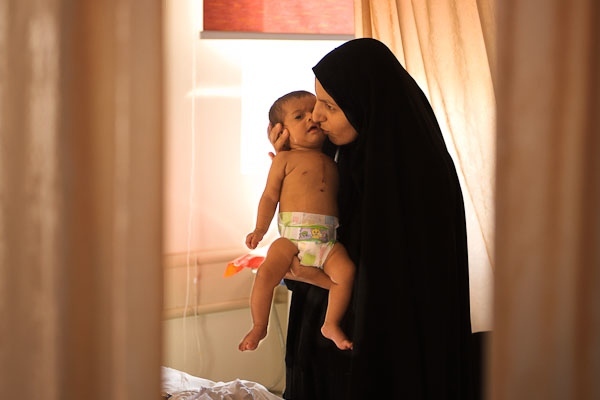With tensions rising in the Middle East, Preemptive Love needs our help now, more than ever. The violence across the country has made their work much more crucial. Below is a guest post by Preemptive Love founder, Jeremy Courtney (@jcourt). Please, please take a few minutes to read his words.
When I moved to Iraq in the middle of the war, I spent all my energy and time thinking about “doing great things” for people in need. Changing the world had mostly to do with changing others.
But it didn’t take long to learn that the most significant changes often occur in the helpers and not just in the lives of those we seek to help.
Today, there is one task whose impact on the world surprises me as much as anything: storytelling.
At Preemptive Love Coalition, we live in Iraq eradicating a backlog of children who are waiting in line for lifesaving heart surgery. And so, I am constantly asked if I am a heart surgeon. It’s funny to see the disappointment in people’s faces as I let them down gently. Their expressions say what I believed going in to this whole thing: “Man! That would have been so cool to meet a heart surgeon living in Iraq… But this guy?!”
“Oh! That’s great! Yeah, you look a little young to be a heart surgeon!”
I get it. I wish I were a heart surgeon, too! But here’s what I’ve learned: the stories we tell are not neutral. They either cost lives or save lives.
The last 5-10 years brought a huge resurgence in talk about “telling our stories”. But I want to explore how the stories we tell around the table, read in the headlines, and share across our blogs shape the way we think about others and, therefore, choose to respond.
There is a reason why #BringBackOurGirls and Nigeria trend on Twitter and similar kidnappings in the Middle East do not. It has to do with the stories we’ve been told about the people involved.
So how do stories save or cost lives?
1) They make us care because
2) They validate what we already believe or
3) They introduce us to a new way of seeing things.
We will get into this more deeply at Allume in October. But for now, suffice it to say that we’ve all been reared on a certain set of stories that influence (even determine) what we believe about the root causes of poverty, violence, and other social ills. Our beliefs about root causes determine what we imagine the solutions to be.
We love stories because they give us heroes on whom we hang our hopes and villains on whom we can cast our sins. While we do have stories that promote “complex” characters, we often prefer the stories with white hats and black hats—not because we are simpletons, but because simple moral frameworks actually help us work out the moral dilemmas in our all-too-complex lives.
The trouble comes when we transfer the black/white storytelling model into our technicolor world. There is very little good vs. evil in the real world. Everyone is a little bit grey. Sometimes the bad guys have legitimate grievances and the good guys are driven by something other than the code of honor.
My wife and I spend our lives trying to tell better stories better. Many of the stories being passed around (or avoided altogether) about Islam, Muslims, the Middle East, poverty, and violence—not to mention Christianity, the Bible, and politics—reflect our tribal tendency to stick together and never question our leaders.
For better or worse, my wife, Jessica, and I ask questions. Is this all there is to the story? Is there something behind the behavior that we’ve never explored? Is there money, power, or politics at play here? Could I respond any differently if I was in their shoes?
We sometimes find it necessary to challenge the party line when everyone else is cheering; or we defend the underdogs when others are calling them terrorists. We poke the dragon; but we also want to know the dragon’s history.
There are real monsters in the world, but all who are vilified are not vile. In short, we don’t only seek to “tell better stories”, but to tell stories better, with more nuance, more backstory, and more space for people to draw their own conclusions.
In America, we have certain stories about Nigeria, Uganda, and Rwanda; about the “war on the family” and the “war on Christians;” about Islam, terrorism, the intractable political problems of the Middle East. In fact, our stories have often led us to believe that political engagement itself is dirty and that the best we can hope for is the conversion of individual hearts.
I’m suggesting that we should not take these assumptions or the stories that shaped them for granted. There are still more stories out there that we need to hear; that we need to tell. And we need more braveheart bloggers who will dare to challenge systems and call us to more than individual action alone.
The longer we assume that our stories are inerrant, the longer they undermine the very change we desire. But the better we become at drinking deeply from a wide array of stories,the more we will increase our capacity to love our neighbor—and yes, even our enemies—as ourselves and actually save lives.
If you want to change the world, taking action might be the last thing you should do. Start with better stories.
So what dragons could you be poking? What monsters might warrant a second look or a listening ear? There could be more to the story! Look for the bald-headed guy at Allume—I’d love to hear about it!!
Click here to learn more about how you can be part of this very important story.
-Jeremy Courtney, PreemptiveLove.org



 Kezia McNab says
Kezia McNab says
July 22, 2014 at 2:11 pmSo inspiring, and so well said….I have been praying about and thinking about this very thing as I write for the non-profit I work for (www.shininglight-intl.com). I want to tell the stories of our friends with hope and dignity and truth in a way that brings true change. I can’t wait to hear more from you at Allume! Thanks for sharing 😉